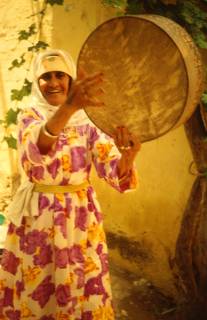| Tony
Langlois Heard
but not seen:
Introduction In the border city of Oujda, North-eastern Morocco, many women gather weekly to chant religious songs, acompanied with hand-clapping and various percussive instruments. These musical offerings are made for the intercession of 'saints' in the relief of everyday problems and stress experienced by the community. These supernatural personalities, whose graves may be sites of local pilgrimage, are considered effective in placating or exorcising djinn, harmful spiritual entities which are believed to attach themselves to humans, causing sickness, and misfortune. The Aissawa is one of several institutions in Oujda which address women's afflictions by producing an ecstatic state through music, dance and a ritual social environment. Here I will describe this practice as I observed it dozens of times in the period between February and July 1994. I will outline the essential structure of the ritual event and show how this functioned as a focus for the complaints of the women who participated in it. I will then consider the practice as a manifestation of social narratives relating to gender and class which, through commual performance, defined feminine identities and channelled both emotional expression and political power within the community. |
